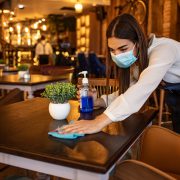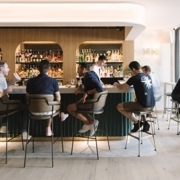THE “SHOW OF CLEANING” IN A POST CORONAVIRUS WORLD FOR CLUBS AND PUBS
Clubs, casinos, restaurants, and pubs across Australia were just coming to terms with new cleaning regimes when the government closed our businesses down. While the additional workloads and costs of cleaning were being worked through based on the ever-tightening restrictions, most managers will recognise a need to maintain enhanced and much more obvious cleaning regimes on the other side of this pandemic.
While our businesses may slowly start returning to normal trade in a few months many of our regular customers, particularly those that are in the older age brackets, will remain fearful for a long time afterwards of going to places that contain large numbers of people. New hygiene standards will have to stay in place, no matter what the cost is to sustain them. Customers who have been self-isolating for long periods will have a heightened sensitivity for deep cleaning practices in any area used by strangers and your club or hotel will be judged on their much higher standards and expectations
Cleaning properties used to be undertaken in venues after the doors had closed for the night, with professional cleaning crews moving in to clean bathrooms, handrails, benchtops and windows, mopping floors and vacuuming carpets. Once we start to reopen our businesses, the standard operating procedures for cleaning will need to be obvious, visible and constant, and become part of the “show of cleaning” in order to overcome customers’ fears. Your customers will not know what has been cleaned unless you make a big show of ensuring they see it actively being done.
While the costs of this cleaning will be high there are a few things that will have to change in order to accommodate it:
- Staffing levels will be higher and more costly as the cleaning process will have to be constant and visible. The old-skool GPU shift will be added back to many rosters.
- Managers will need to re-write job descriptions to include many deep cleaning tasks on a regular shift for staff and ensure there are enough staff on each shift to cover the extra work.
- Staff will have to accept that cleaning is going to be part of their job in a post coronavirus world. Many tasks that have been done at night by professional cleaners will have to become part of their normal work shift for club and hotel employees.
- Installing extra hand sanitizer stations in your public areas and completing refills during times when customers are in.
- Having a supply of disinfecting wipes in the gaming room for customers to wipe down machines before they play.
- Small re-writable signs for lounge tables, restaurant tables and gaming machines that state when the equipment had been wiped down at specific times by staff. When they are in place on a machine or table it is a signal to customers that they are clean. Staff remove them when someone is using the machine or furniture. It then gets cleaned and the sign replaced once they leave. This would be very handy on poker machines.
- Is it time to introduce white gloves for staff in the entrance to a club? It would be an unconscious signal to a member of the level of cleanliness the venue maintains and expects.
- Marketing should include new cleanliness standards as part of the new marketing campaigns once clubs and hotels start to reopen.
The advantage to some of this is that the professional cleaning costs may be able to be reduced to offset some of the additional costs as staff should have the venue spotless at the end of each trading day.
Clubs, hotels and restaurants that don’t adhere to strict cleaning standards in future will pay a financial price for failing to increase visible cleaning protocols. There is no doubt that the scars of the current pandemic will see “unclean” mean the same thing as “unsafe” by a much more attentive public. By making cleaning part of the “show”, and obvious to customers, venues can send a positive message and ensure repeat visits once we reopen
By Justine Channing – Cream Gaming & Strategy Specialist
© The Drop 2019 – Material may not be reproduced or distributed without the authors consent













